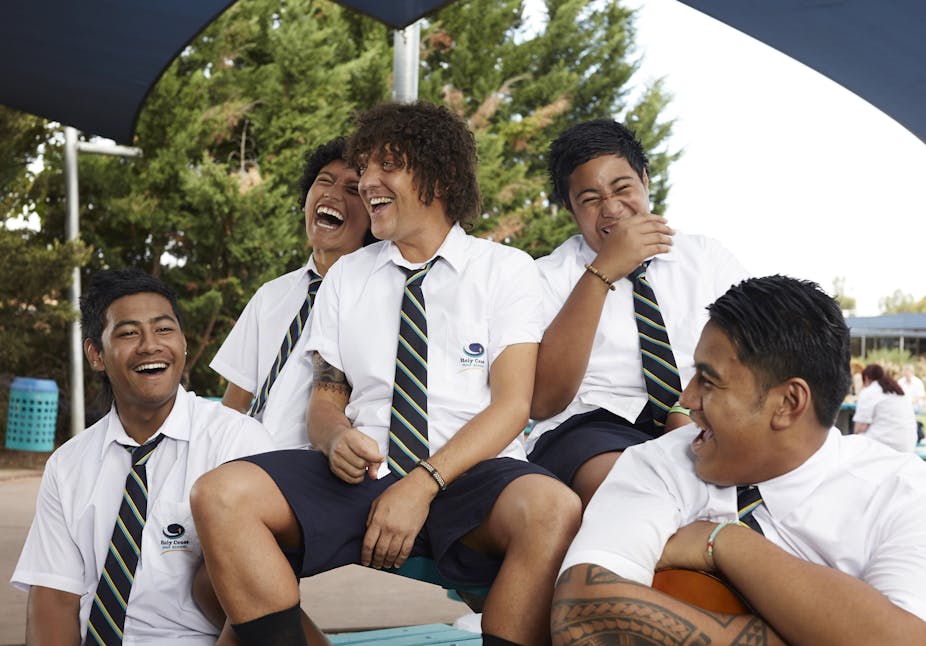Chris Lilley has long been a high maintenance love object. Last night, the first episode of Jonah From Tonga was broadcast on ABC1.
Critics have had an easy time finding humour in socially “well-placed” individuals like drama teacher Mr G and particularly Ja’mie King (last year’s dismally received Ja’mie: Private School Girl notwithstanding), with their qualities of personal aggrandisement and cultural insensitivity. Their cultivation of undeserved celebrity, desire for power that borders on the delusional, self-construction as elite, and deafness to social codes has provided many easy laughs.
In keeping with humour that encourages us to laugh at others – I am tempted to say all contemporary media satire – Lilley’s spoofing of these characters contains a belligerent quality that is unconflicted because of the characters’ privileged social positioning.
Laughing at the down and out
But humour that emerges around Lilley’s disenfranchised characters has been a little more challenging.

Were the urination and hot rod antics performed by Daniel and his mates in Lilley’s third show Angry Boys a more serious testament to the lack of opportunities for rural youth? Was Gran’s bullying evidence of the harassment to which young offenders are routinely subjected? Or were both simply further evidence of taboo busting carried out at the expense of the down and out?
Herein lies the essence of “cringe” that I want to claim as an Australian form (although there’s plenty of evidence of it overseas) – if only because performers such as Lilley do it so damn well.
And so to Jonah from Tonga.
While the first episode aired last night on the ABC, in an odd and somewhat schizoid programming move all six episodes of the show were available for binge viewing over the weekend but were pulled down Sunday evening. It was, perhaps, a gesture to new, youthful viewerships and the blog-o-gentia coupled with a need to monetise some episodes at a later date.
Even if you missed the binge and only watched the first episode last night, you probably know how some of the conversations about the show will go.

Because Jonah is the quintessential “naughty” schoolboy and proverbial student at risk, viewers of the show will spend time confronting the shortcomings of remedial education, with its tolerance for bullying and pedagogical impotence in the face of economic disenfranchisement.
Hierarchies in the peer group at the school and between the school kids and slightly older youth outside will reveal the lack of opportunity that awaits all the “Jonahs” in Australia, regardless of race.
This is powerful stuff, social critique at its best, even if we have to wade through a mountain of dick jokes (and several episodes) to get to it.
What if Jonah wasn’t from Tonga?
Social commentary aside, what I am finally unsure about is what it means that the lead character hails from Tonga. Apart from the fact that viewers know Jonah from Summer Heights High, how would the show be different had the character been drawn from another disenfranchised migrant group or indeed as a white character from a family confronting chronic unemployment?
Lilley’s “racial drag” characters have copped a lot of criticism in the past, reaching a pinnacle with Angry Boys’ S’Mouse, whom reviewers found almost unanimously annoying and hard to adopt.
Lilley himself acknowledged that Australian audiences “struggled” with S’Mouse, no small part because of concerns about how the character would travel. “Goodness knows how this will go in the US”, summed up one writer, acknowledging the significance of Lilley as an export product.
Whether the current show’s lead character, who is not likely to offend any Americans, elicits similar concerns remains to be seen. But I hope the discussion continues.
In my mind, debate about the power and purpose of button-pushing comedy like Chris Lilley’s can only be a good thing. Whether we like it or not, Australia has a relationship to racial drag and blackface – think of Sam Newman or the 2009 Hey Hey sketch – that is only beginning to be acknowledged in the public sphere.
If Jonah can be a vehicle to further dialogue about that, I am a big fan.

